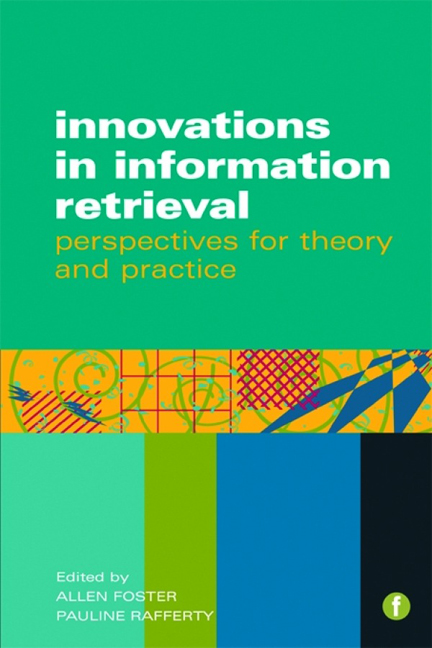Book contents
- Frontmatter
- Contents
- Figures and tables
- Contributors
- Foreword
- Introduction
- 1 Encountering on the road to Serendip? Browsing in new information environments
- 2 Classification revisited: a web of knowledge
- 3 Approaches to fiction retrieval research: from theory to practice?
- 4 Music information retrieval research
- 5 Folksonomies, social tagging and information retrieval
- 6 Digital information interaction as semantic navigation
- 7 Assessing web search engines: a webometric approach
- Index
2 - Classification revisited: a web of knowledge
Published online by Cambridge University Press: 08 June 2018
- Frontmatter
- Contents
- Figures and tables
- Contributors
- Foreword
- Introduction
- 1 Encountering on the road to Serendip? Browsing in new information environments
- 2 Classification revisited: a web of knowledge
- 3 Approaches to fiction retrieval research: from theory to practice?
- 4 Music information retrieval research
- 5 Folksonomies, social tagging and information retrieval
- 6 Digital information interaction as semantic navigation
- 7 Assessing web search engines: a webometric approach
- Index
Summary
Introduction
The vision of the semantic web is gradually unfolding and taking shape through a web of linked data, a part of which is built by capturing semantics stored in existing knowledge organization systems (KOS), subject metadata and resource metadata. The content of vast bibliographic collections is currently categorized by some widely used bibliographic classification and we may soon see them being mined for information and linked in a meaningful way across the web. Bibliographic classifications are designed for knowledge mediation, which offers both a rich terminology and different ways in which concepts can be categorized and related to each other in the universe of knowledge. From 1990 to 2010 they have been used in various resource discovery services on the web, and they continue to be used to support information integration in a number of international digital library projects. In this chapter we will revisit some of the ways in which universal classifications, as language-independent concept schemes, can assist humans and computers in structuring and presenting information and formulating queries. Most importantly, we will highlight issues important to understanding bibliographic classifications, identifying both their unused potential and their technical limitations.
Background
Classifications are created using the intellectual power of ontological observation and analysis and reflect whichever approach one decides to take in defining and grouping things. Whatever the motive for their creation, classifications are logically and semantically organized schemes of concepts representing some kind of reality and, as such, are essential and versatile tools for the representation and visualization of a knowledge space. A classification, by nature, cannot serve all purposes; however, if it is universal with respect to knowledge coverage and structured in a comprehensive, detailed, highly elaborate and logical way, it is likely to be more versatile than a scheme created for one single subject, system or task.
Bibliographic or documentary classifications are a special kind of knowledge classification designed for the mediation of knowledge. Their unique feature is that they are not concerned with objects or entities, as other knowledge classifications, but rather with subjects, i.e. the ways in which entities are described in documents. Bibliographic classifications will systematize phenomena and the topics that can be studied in relation to these phenomena, but will also provide the vocabulary necessary to denote types of knowledge presentation, points of view, the targeted audience or form of document.
- Type
- Chapter
- Information
- Innovations in Information RetrievalPerspectives for theory and practice, pp. 23 - 48Publisher: FacetPrint publication year: 2011
- 1
- Cited by



